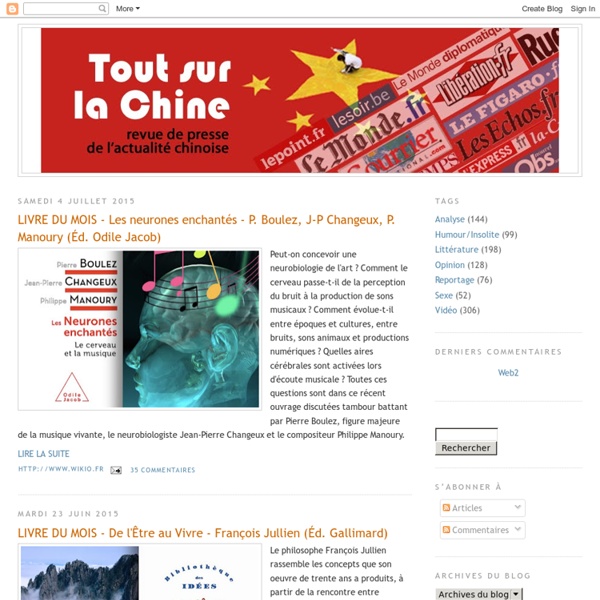



Rationalité Limitée chinaSMACK - Hot internet stories, pictures, & videos in China LES COULOIRS DE BERCY Le gouvernement va démissionner demain et Bercy va se retrouver orphelin. Voici quelques questions auxquelles François Hollande devra répondre avant de nommer le ou les successeurs de François Baroin et Valérie Pécresse. Mes réponses ou hypothèses ne sont que pure conjecture. Combien de Bercy? Quand il est arrivé au pouvoir, en 2007, Nicolas Sarkozy a voulu « casser la forteresse » en créant deux ministères à Bercy: l’un pour l’Economie, l’autre pour les Comptes publics. Cette dichotomie a été beaucoup critiquée, y compris à droite. François Hollande va devoir répondre à plusieurs questions avant de trouver le ou les nouveau(x) locataire(s) de Bercy (Photo: Reuters) Quel profil politique? Quel signal donner à l’Europe? Quel casting, alors?
Centre d'Informations Internet de Chine ataxingmatter In Part I, I outlined some of the many ways in which the U.S. provides favorable treatment to religious institutions and/or their representatives, including income exclusions from the federal income tax for ministers that are unavailable to any other occupation. In this Part II, I want to consider how the corporatization of religion relates to increased politicization of religious fundamentalism in recent decades and the religious right's incessant push to influence public policies. Then in Part III I will return to the uneasy juncture of religious freedom claims and taxation. A caveat. Think about Abe Lincoln as described in this US News article (Dan Gilgoff, Abraham Lincoln's Religious Uncertainty, US News, Feb. 12, 2009). Remember Kennedy's candidacy in 1960, and the real concern that his Catholicism might cost him the election. These [concerns outlined above] are the real issues which should decide this campaign. Megachurch and televangelist ministers gross enormous salaries.
Documentaire - CNTV - CCTV-F Francais Arts et Culture Villes et Régions Energie et Environnement Portrait et Histoire Trésors et Objets Gastronomie Ecopublix WWW.SINA.COM Across the Curve The Adam Smith Institute Blog Ezra Klein has launched his new site, Vox.com, with an essay on ‘how politics makes us stupid’. The piece is provocative, and Klein uses some interesting examples. Most striking is the study that shows that people’s maths skills get worse when the problem they’re dealing with has a political element and goes against their political instincts. The basic claim is that people engage in ‘motivated reasoning’ when they think about politics – in other words, they think in order to justify what they already believe, not in order to discover the truth. This ‘identity-protective cognition’, as he calls it, makes sense – a pundit who decides that the other side is right about some particular political issue (Klein uses global warming as an example) has a lot to lose in terms of status within the group they’re part of, and little to gain by being right. Even though that might seem plausible, I think he is assuming too much and is wrong about some of the phenomena he identifies.
Adam Smith Lives! The Janet Prindle Institute for Ethics at DePauw University is sponsoring an Undergraduate Ethics Symposium April 8-10, 2010. This conference is shaped around a series of workshops in which students present to one another their best work on a subject of ethical concern. I write to invite you to encourage your faculty to bring this event to the attention of their students. The students whose works are accepted for the symposium will benefit from the critiques and comments of their peers in the seminar, and also from the visiting scholar or creative writer who will direct the workshop. This is an honors symposium, and those students whose works are received by the February 1 deadline and accepted for inclusion in the conference program by panels of DePauw faculty members will have all of their expenses paid for the conference. Sincerely, Martha Rainbolt Coordinator, Janet Prindle Institute for Ethics
Economist's View Daniel W. Drezner | FOREIGN POLICY